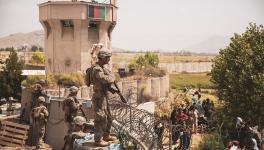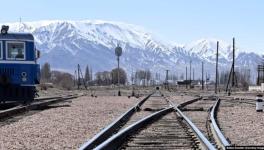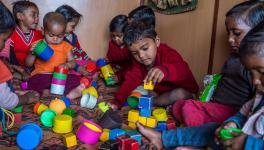Afghan Women Dread Return to ‘Dark Days’ as Taliban Capture More Territory

Revolutionary Association of the Women of Afghanistan (RAWA) protest against the Taliban in April 1998. Image used for representational purpose only. | Image Courtesy: Wikimedia Commons
Kabul: It was early evening and Zahra, her mother and three sisters were on their way to dinner at another sister's home when they saw people running and heard gunshots on the street.
“The Taliban are here!” people screamed.
In just a few minutes, everything changed for the 26-year-old resident of Herat, Afghanistan's third-largest city.
Zahra grew up in a mostly Taliban-free Afghanistan, where women dared to dream of careers and girls got an education. For the past five years, she has been working with local non-profit organisations to raise awareness for women and press for gender equality.
Her dreams and ambitions came crashing down on Thursday evening as the Taliban swept into the city, planting their white flags emblazoned with an Islamic proclamation of faith in a central square as people on motorcycles and in cars rushed to their homes.
Like most other residents, Zahra, her parents and five siblings are now hunkering indoors, too scared to go out and worried about the future. The Associated Press chose not to identify her by her full name to avoid making her a target.
“I am in big shock,” said Zahra, a round-faced, soft-spoken young woman. “How can it be possible for me as a woman who has worked so hard and tried to learn and advance, to now have to hide myself and stay at home?”
Amid a lightning offensive over the past several days, the Taliban now control more than two-thirds of the country, just two weeks before the US plans to withdraw its last troops. And they are slowly closing in on the capital, Kabul.
The UN refugee agency says nearly 250,000 Afghans have fled their homes since the end of May amid fears the Taliban would reimpose their strict and ruthless interpretation of Islam, all but eliminating women's rights. Eighty per cent of those displaced are women and children.
The fundamentalist group ruled the country for five years until the 2001 US-led invasion. During that time, it forbade girls an education and women the right to work, and refused even to let them travel outside their homes without a male relative to accompany them. The Taliban also carried out public executions, chopped off the hands of thieves and stoned women accused of adultery.
There have been no confirmed reports of such extreme measures in areas the Taliban fighters recently seized. But militants were reported to have taken over some houses and set fire to at least one school.
At a park in Kabul, transformed since last week into a shelter for the displaced, families told the AP on Friday that girls riding home in a motorised rickshaw in the northern Takhar province were stopped and lashed for wearing “revealing sandals.”
A schoolteacher from the province said no one was allowed to go out to the market without a male escort. Some 3,000 families mainly from northern provinces recently taken over by the Taliban now live in tents inside the park, some on the sidewalks.
Zahra stopped going to the office about a month ago as the militants approached Herat, and she worked remotely from home. But on Thursday, Taliban fighters broke through the city's defensive lines, and she has been unable to work since.
Her eyes welled up with tears as she considered the possibility that she will not be able to return to work; that her 12-year-old sister will be unable to continue going to school (“She loves learning"); that her older brother will not be able play football; or that she won't be able to freely play the guitar again. The instrument hung on a wall behind her as she spoke.
She listed some of the achievements made by women in the past 20 years since the Taliban's ouster — incremental but meaningful gains in what is still a deeply conservative, male-dominated society: Girls are now in school, and women are in Parliament, government and business.
Marianne O'Grady, Kabul-based deputy country director for Care International, said the strides made by women over the past two decades have been dramatic, particularly in urban areas, adding she cannot see things going back to the way they were, even with a Taliban takeover.
“You can't uneducate millions of people,” she said. If women "are back behind walls and not able to go out as much, at least they can now educate their cousins and their neighbours and their own children in ways that couldn't happen 25 years ago."
Still, a sense of dread appears to be omnipresent, particularly among women, as Taliban forces take more territory each day.
“I feel we are like a bird who makes a nest for a living and spends all the time building it, but then suddenly and helplessly watches others destroy it,” said Zarmina Kakar, a 26-year-old women's rights activist in Kabul.
Kakar was a year old when the Taliban entered Kabul the first time in 1996, and she recalled a time when her mother took her out to buy her ice cream, back when the Taliban ruled. Her mother was whipped by a Taliban fighter for revealing her face for a couple of minutes.
“Today again, I feel that if Taliban come to power, we will return back to the same dark days,” she said.
Get the latest reports & analysis with people's perspective on Protests, movements & deep analytical videos, discussions of the current affairs in your Telegram app. Subscribe to NewsClick's Telegram channel & get Real-Time updates on stories, as they get published on our website.
























